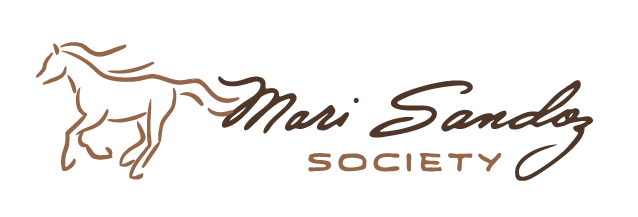2021 Mari Sandoz Symposium, September 24, 2021
"The Life and Places of Mari Sandoz"
The Pilster Lecture and sessions of the Mari Sandoz Symposium were recorded. They can be found on the Society's YouTube page. CLICK HERE TO GO TO THE VIDEOS
"Mari Sandoz and Her Cities"
[Lincoln] "Greenwich Village in Nebraska: Mari Sandoz’s Bohemian Life on the Great Plains"
Before Mari Sandoz moved to New York City’s Greenwich Village, she lived in Lincoln, Nebraska, from 1919 to 1940, a period she once acknowledged as her “Greenwich Village time”—a time when she lived the bohemian life of a starving artist and fostered relationships with individuals who challenged conventions of gender and sexuality. Sandoz’s relationships, especially with a gay university professor named Melvin Van den Bark, reveal a dimension of her attitude toward gender and sexuality previously unexplored and may force us to reconsider the contours of her life.
[Denver] "Plains Spoken: The Voice of Mari Sandoz in the Mountain West "
Frisbee will share with the audience the development of Sandoz’s work and professional life in Denver and other parts of the Mountain West. As Sandoz left Nebraska to embark on new projects, she would use Denver as stepping stone to the life of a writer in the urban East who communicated in the language of the West.
[New York] "From the Sandhills to the City: Mari Sandoz, Western Writing, and New York Living"
Nelson's talk will offer insight of the decades Sandoz lived in New York City. Many of her fans believed she resented her residence there because it was nothing like Nebraska. But Sandoz thrived in this eastern hub of artists, writers, intellectuals, performers, musicians, and eclectic characters. They fueled her with energy to write about some of the most complex and violent events in American history.
Speakers: Jamison Wyatt, University of Nebraska-Lincoln, Dr. Meg Frisbee, Metropolitan State University of Denver, Dr. Elaine Marie Nelson, University of Kansas
Moderator: Dr. Renee Laegreid, University of Wyoming
“Don’t Mind If You Won’t Find My Work Salable—I Won’t” Mari Sandoz’s Writing and Research Methodologies
Mari Sandoz’s activism shows the deep respect Sandoz held for the disenfranchised groups of Native Americans, women, and farmers and laborers she discussed. Misrepresentations in other texts and in Hollywood film adaptations disenchanted and infuriated Sandoz. Her frustration stemmed from both blatant intolerance and ignorance of tribal histories and a complete disregard for women and workers’ rights by those in power. This presentation focuses on Sandoz’s method in correcting the record and the resultant effects of her work. Specifically, I will discuss the strategies Sandoz used in her writing including her research methodology, her writing style and approach, interview tactics, and her response to criticism and publishers.
Speaker: Dr. Jillian Wenburg, Park University
Moderator: Heather Stauffer, University of Nebraska Press
“Pretty Hopeless with a Sealskin Jacket: Mari Sandoz and Hollywood”
Even before Old Jules was published, Mari Sandoz began fielding offers from major film studios. For 29 years, the silver screen beckoned with a surprising number of Sandoz works proposed for cinematic adaptation. Based primarily on correspondence, this talk will examine Mari’s experience with Hollywood throughout her life, as she came to terms with Hollywood and the modest financial windfalls from licensing film rights, culminating with the release of Cheyenne Autumn, acclaimed filmmaker John Ford’s last film and the only major studio production of a Sandoz work. Although her skepticism of the historical accuracy possible in a major studio film never waned, Sandoz’s desire to increase sales of her books held final sway.
Speaker: Dr. David Nesheim, Chadron State College
Moderator: Dr. Ron Hull
